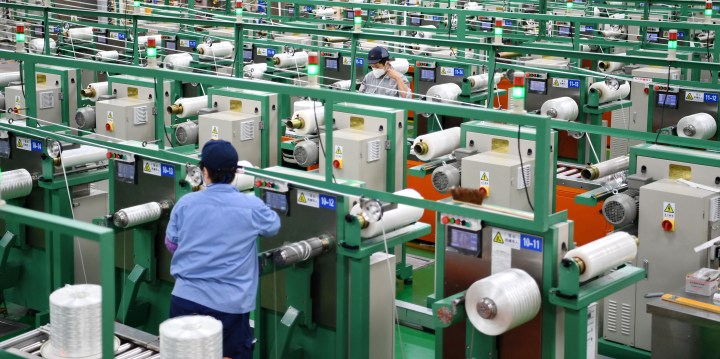PLATINUM GROUP METALS
On the sly, Chinese chemists have eroded SA’s PGM industry

Rejigging the mix in the fibreglass recipe and China selling on the savings domestically has cut deep.
About three years ago, Chinese manufacturers of fibreglass began shifting the metals mix in their product in ways that would have profound implications for platinum group metals (PGM) producers and, by extension, South Africa’s ailing economy. Rhodium had just scaled record highs of close to $30,000 an ounce, making it the most expensive precious metal in recorded history. For Chinese brands of fibreglass, this rendered its cost radioactive.
This had huge implications for the global economy as China accounts for 70% of the global production of fibreglass, which has a range of industrial applications, including in the blades of the wind turbines that are helping to power the green energy transition.
Alloy mix changed
“Rhodium has suffered tremendously from substitution in the Chinese fibreglass industry,” Paul Dunne, CEO of Northam Platinum, told journalists during the company’s recent results presentation.
“Historically, the fibreglass industry has used an alloy composed of 80% platinum and 20% rhodium. They moved – unbeknown to us – the alloy from an 80/20 mix to a 95/5 mix. When they did this they sacrificed performance of the alloy, but the price incentive was good enough to take that sacrifice.”
PGMs all lie next to each other in groups 8 to 10 on the periodic table of elements. What clearly happened was that Chinese chemists applied their minds and found a way to substitute far cheaper platinum for rhodium in the mix of the alloy used for fibreglass.
A veil of secrecy was wrapped around this shake-up in the recipe for competitive reasons – for example, KFC doesn’t reveal its “11 herbs and spices”. But PGM producers quickly realised that something was amiss as the world’s most valuable precious metal swiftly lost its lustre, sending its price into a nosedive.
Meanwhile, platinum did not gain much traction from this state of affairs, so Chinese makers of fibreglass had a much cheaper way of making their product, even if it was perhaps not quite up to scratch.
Platinum has been flatlining since then, roughly between $900 and $1,000 an ounce, and rhodium lost about half of its value from its lofty peaks in April 2021 to November of that year.
Chinese excess stock
It then had a dead-cat bounce and reached the bottom of its current cycle in August last year, when it hit about $4,100 an ounce. It’s been flat since. In its recent results for 2023, Sibanye-Stillwater noted: “The rhodium price continued to decline [in 2023], falling 64% from $12,250/oz to $4,425/oz… Chinese glass manufacturers that had thrifted rhodium from their processing, owing to the high price, sold the metal into the domestic market, resulting in significantly reduced imports into China.”
This was a double whammy. The fibreglass makers were using far less rhodium and selling their excess stock to the domestic market. This, in turn, meant that other Chinese industries that use rhodium required less of the metal from South Africa.
South Africa accounts for close to 90% of global rhodium production, but among the country’s total output of PGMs it accounts for less than 10% of the basket. When rhodium’s price hit close to $30,000 an ounce, that small percentage of production amounted to the lion’s share of the record profits South African PGM producers were reaping a few years ago.
The price of palladium close to three years ago was also fetching record prices of over $2,900 an ounce, driven by a range of factors, including the switch to petrol from diesel engines in key markets amid concerns about supplies. Palladium is a key catalyst for petrol engines.
These record prices flowed to the bottom line of South African PGM producers. The taxes and royalties paid on those earnings threw a lifeline at the time to the cash-strapped National Treasury.
South Africa’s current debt-to-GDP ratios would be worse were it not for that confluence of events, and the rand exchange rate would likely have been worse without those hard-currency export earnings to prop it up.
Chemistry counts
The saga underscores how a switch in the ingredients for an obscure cog in the global industrial wheel can have far-reaching consequences. Chemistry clearly counts. And secretive “substitution” or “thrifting” is no doubt taking place in other industries as chemists mix and match from groups 8 to 10.
The PGM market has also been undermined on other fronts, notably the still fragile global economy, high interest rates and the hype about battery electric vehicles (EVs) – which require other metals such as cobalt and lithium – overtaking the internal combustion engine. The result has been a bloodbath.
All South Africa’s main PGM producers have posted sharply lower earnings or, in the case of Sibanye-Stillwater, fallen deeply into a loss on massive asset impairments. A wave of job losses and shaft closures looms over South Africa’s PGM regions.
Still, commodity prices are cyclical, and PGM producers maintain that, in the longer run, the fundamentals are sound. EV demand is faltering and production forecasts for light-duty vehicles using hybrids or internal combustion engines are expected to rise for the rest of this decade at least.
“This is still the automotive decade, so those metals are platinum, palladium and rhodium,” Dunne told Daily Maverick in an interview. “In the next decade, the hydrogen economy will be into its full commercialisation and industrialisation phase, and the hydrogen metals are platinum, iridium and ruthenium… They will become very important for the hydrogen economy. There is also a possibility that you can mix and match.”
Indeed, there is that possibility. And in some lab out there, someone is mixing and matching PGMs, and the results could again shake up the sector, for better or worse. DM
This story first appeared in our weekly Daily Maverick 168 newspaper, which is available countrywide for R29.




















Ag shame. You win some, you lose some.
I don’t see a problem, except for DM trying to paint a sinister picture with the choice of headline wording, when there isn’t one.
“What clearly happened was that Chinese chemists applied their minds and found a way….”. Yes, exactly. They’re just performing their free market duties. South Africans should watch and learn.
Thats fine but lets hope the consumer punishes them. A Chinese car for instance that uses a different cheaper metal alloy mix for its gearbox and engine may get away with it for many years but eventually the consumer realises that although German cars are more expensive they also last much longer and don’t break down as much. Anyone notice all the rust on a Tata. It maybe cheap but its poor quality. A nice boat made out of dodgy chinese fibreglass might develop cracks within a few years because it does not have enough Rhodium in it!
Perhaps the ANC will now learn that the Chinese will look after their own interests first – as any country should – and stop being X’s obedient little slave. And someone please tell our President that when dealing with China one should always keep a close eye in your trade balance with them. The Chinese are colonizing Africa and if we are not careful our children will be enslaved to them in some form or another in the not too distant future.
China are the new “colonialists”. Its hilarious that African governments don’t see this! Basic human rights….the very thing that the majority fought so hard for, does not exist in the Chinese vocabulary…..
I believe they do see it but they don’t care as they are being paid off.
That does not matter to those folks. All that matters is ownage of the West. They are participating vicariously in the West “losing its power.”
You should hear Ramaphosa talk of a multi polar world instead of a unipolar world as it that ever existed.
What surprises me is that rhodium and platinum are in fibre-glass at all. There is no mention of them in the Wikipedia entry on the constituents of fibre and I’m surprised the volume is sufficient to affect the metals prices that much, even though I accept there is a huge amount of the stuff produced. But I guess we learn something new every day.
its used for the extrusion of the glass fibres – its doesnt get consumed it is just a plate with holes in it that allows the molten glass to pass through forming strands. It withstands the high temperatures and pressures of the process.
Anyhow this whole story has nothing to do with Chemistry Ed its just thrifting – the American fibre glass companies also did the same (switch out the Rh) and we’re not writing about that. The only thing thats different is that the Chinese announced it to the market in a public way and then everyone sat up and sold the hell out of Rh.
Trying to make China a bogey man? Doesn’t hold in this case.
Everyone is trying to get rid of platinum group metals due to cost.
Europe is effectively banning diesel which in effect gets rid of platinum catalytic converter exhausts. Hence the lower prices for platinum.